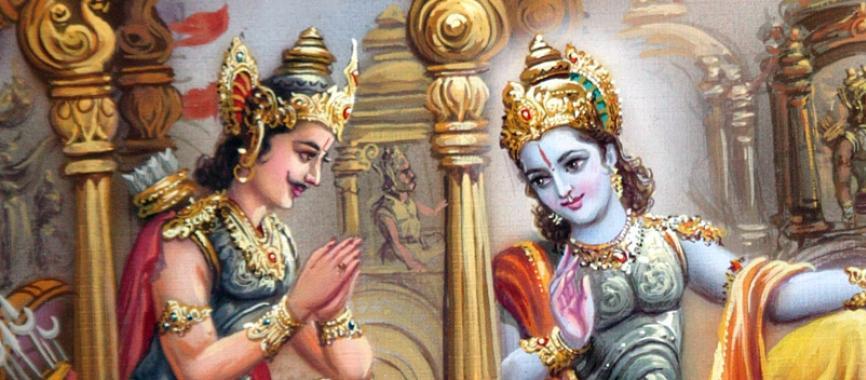
The previous article described Shree Krishna’s explanation to Arjun about how physical actions do not need to be abandoned in order to be freed from the bondage of karm – only the attachment to the actions needs to be abandoned. He explained that there are two ways of freeing the mind from its attachment to actions: karm yog and gyan yog. Finally he instructed Arjun to attach his mind exclusively to Him and offer all his actions to Him, in order to attain Him (chapter 3, verses 19 & 30).
- Three ways of conducting our duties
At this point, it will be helpful to remember that there are three ways of doing one’s duty or dharm:
- As an offering to God, with no motivation other than to please God.
- Without thinking of God, but also without having attachment to the outcome of the action.
- With attachment to the outcome of the action.
The person in case #1 is free from the bondage of the action and in the end, attains God because this person has surrendered themselves to God. Case #2 frees one from the bondage of the action but does not result in God realization because this person isn’t surrendered to God. Case #3 only results in further bondage.
So far, all of Shree Krishna’s admonishments to Arjun have been along the lines of either #1 or #2. However, this still leaves us with Arjun’s question about the need for him to fight the war. Could he not renounce his involvement in the war and, living the life of an ascetic, pass his days with his mind absorbed in thoughts of God? That too would free him from the bondage of karm and result in God realization. Then why does Shree Krishna prefer Arjun to perform his duty of fighting the war, rather than to abandon his physical involvement in society and adopt the life of an ascetic?
- God and Saints perform their duty to benefit others
Shree Krishna tells Arjun that just as an ignorant person performs actions with attachment, a wise person wishing for the betterment of the world perform actions while being free from attachment (chapter 3, verse 25). Why is this important? After all, the wise person has understood that his/her goal is God realization – then why maintain any involvement in society and family? The reason is that if the wise person renounces his involvement in societal and family duties, it may create confusion in the minds of ignorant people who are attached to their actions (chapter 3, verse 26). Instead, by properly performing all of his prescribed duties, a wise person should inspire those who are ignorant to do likewise, because whatever actions great people perform, others follow (chapter 3, verse 21).
Shree Krishna explains that this is, in fact, one of the reasons that He comes to this world and performs actions. Even though He is not bound to perform any duties (because He is beyond dharm and adharm), nor is there anything in all of creation for Him to attain (because it all belongs to Him already), yet, He is engaged in the performance of His duties (chapter 3, verse 22). He reasons that if at any time He were to not attentively perform His duties, all humankind would go astray and be ruined. He says that He would become responsible for their confusion (with respect to what is proper conduct) and the cause of their downfall, because people follow His example in all respects (chapter 3, verses 23 & 24).
The God realized personalities are in a similar situation. A saint has no reason to perform any action for himself, because he is already immersed in Divine bliss. Having attained God, he is completely self-contented and blissful from within. Then what does he need from the world? Such an individual has no dependence on any living being for anything, and nothing to gain from performing duties, because all the duties are to take a person to God. After attaining God, there is nothing left to attain, and thus, nothing left to do (chapter 3, verses 17 & 18). And yet, God realized saints also stay in the world and perform actions. Shree Krishna gives the example of King Janak, who was established in a state of Divine perfection, yet continued to perform all of his duties (chapter 3, verse 20).
To summarize, Shree Krishna advises Arjun to perform his duty by fighting the war because he is in a position of leadership, and his actions will be observed and emulated by others. If he decides not to fight, people will not understand the reasons why – they will only see that Arjun has abandoned his duty. Thus, in order to not create confusion in the minds of others, and to set a good example, Arjun should perform his duty – even though he has nothing to personally gain from it. This will influence the society in a positive way, and Arjun will still be free from the bondage of karm, and will attain God, as long as he keeps his mind in God all the time, and offers all his actions to Him.
At the end of the third chapter, Arjun asks Shree Krishna a very practical question. He wants to know why it is that we do wrong things, even when we know it is wrong. What force is it that compels us to knowingly do wrong, almost against our will (chapter 3, verse 36)? We will see how Shree Krishna answers this in the next article.



 TV Asia
TV Asia Aastha:
Aastha:




 To inspire devotion to Radha Krishna by sharing the teachings of Sanatan Dharm Hindu scriptures, practicing the philosophy and practical aspects of Bhakti through Spiritual Discourses, Satsangs, Family Camps and Meditation programs
To inspire devotion to Radha Krishna by sharing the teachings of Sanatan Dharm Hindu scriptures, practicing the philosophy and practical aspects of Bhakti through Spiritual Discourses, Satsangs, Family Camps and Meditation programs To provide youth, living in the western culture, a deep immersion into Indian tradition, culture and give them skills that can help children excel at school and in life
To provide youth, living in the western culture, a deep immersion into Indian tradition, culture and give them skills that can help children excel at school and in life

 To Teach The True Knowledge of Hindu Vedic Scriptures and to ensure authentic teachings of Hindu religion are available for future generations in a simplified, practical way that is combined with logical scientific explanations as to how we can make them relevant to modern living.
To Teach The True Knowledge of Hindu Vedic Scriptures and to ensure authentic teachings of Hindu religion are available for future generations in a simplified, practical way that is combined with logical scientific explanations as to how we can make them relevant to modern living. To Teach The Practical Form Of Devotion
To Teach The Practical Form Of Devotion To Help Souls In Need through support of Humanitarian and Charitable Projects. This way we can not only improve the material welfare of society but elevate our own self through the act of giving and thereby accelerating our own spiritual progress.
To Help Souls In Need through support of Humanitarian and Charitable Projects. This way we can not only improve the material welfare of society but elevate our own self through the act of giving and thereby accelerating our own spiritual progress.